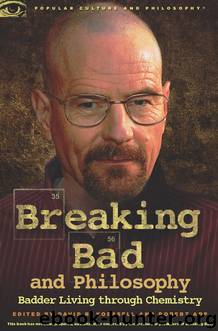Breaking Bad and Philosophy by David Koepsell

Author:David Koepsell
Language: eng
Format: epub
ISBN: 9780812697902
Publisher: Open Court
Acting Like Tuco
Even if we agree that we should do what’s best for the most people possible when we can, it also seems to make sense that what’s good for us and our loved ones takes precedence over what’s good for complete strangers or known criminals. Walt must be of this opinion when he decides that he should make meth for strangers for his family’s benefit. Agent-centered consequentialism is the variation of consequentialism that appears to be consistent with Walt’s actions in this regard.
Agent-centered consequentialists judge actions based on their consequences (as consequentialists), but they also argue that the most important consequences are those for the person carrying out the actions that produce those consequences—the “agent.” Morally good actions thus benefit the agent and everyone else or benefit the agent without harming everyone else. This view of morality accords with our intuitions for the preservation of ourselves, our families, or our country.
Yet, if we agree that rule consequentialism makes better sense of our moral intuitions than act consequentialism, agent-centered consequentialism looks more difficult to accept. Why? Because some actions that produce preferable consequences for their “agent” and everyone else would be bad for most people if followed as a rule of thumb. Though this sounds confusing, considering the actions of a sociopath like Tuco makes this clear.
Even within the counter-culture of people active in making, distributing, and using meth—the community for whom Tuco increases overall desired consequences by succeeding in widely distributing the drug—he’s not a good guy. Rule consequentialism accounts for this, and agent centered consequentialism does not. Tuco’s self-interested actions tend to provide the drug community with what they take to be good, but his behavior isn’t desirable as a rule. If everyone acted like Tuco, the overall “good” for everyone (a supply of meth) would probably not increase or even remain stable. If everyone in that community were actively trying to gain control by instilling fear in everyone else with gratuitous violence, meth distribution would likely suffer—as it does when the cartel is at war with Gus Fring.
But wait! Isn’t Tuco just a bad example of someone whose actions tend to promote personal and overall good but which are bad for everyone if followed as a rule, because he’s not rationally achieving his ends to begin with? If so, then agent-focused consequentialism might be okay, and we might justify Walt’s new career. Though we may think him insane, it’s arguable that Tuco’s behavior is rational! His goal is to maintain control by instilling fear in his competitors. And relative to this goal he is acting in ways that do the job quite well. Tuco’s violent wild-card approach is so rational that Walt (as Heisenberg) turns the tables on Tuco, and later Gus, by copying his tactics and blowing things up to gain the upper hand in the finales of Seasons One and Four.
Still, even if it’s a rational way of gaining control, surely there’s something morally wrong with the way Walt strikes back at Tuco and Gus—just as there’s something wrong with Tuco’s modus operandi.
Download
This site does not store any files on its server. We only index and link to content provided by other sites. Please contact the content providers to delete copyright contents if any and email us, we'll remove relevant links or contents immediately.
| Anthropology | Archaeology |
| Philosophy | Politics & Government |
| Social Sciences | Sociology |
| Women's Studies |
The remains of the day by Kazuo Ishiguro(8999)
Tools of Titans by Timothy Ferriss(8396)
Giovanni's Room by James Baldwin(7346)
The Black Swan by Nassim Nicholas Taleb(7129)
Inner Engineering: A Yogi's Guide to Joy by Sadhguru(6794)
The Way of Zen by Alan W. Watts(6614)
The Power of Now: A Guide to Spiritual Enlightenment by Eckhart Tolle(5781)
Asking the Right Questions: A Guide to Critical Thinking by M. Neil Browne & Stuart M. Keeley(5775)
The Six Wives Of Henry VIII (WOMEN IN HISTORY) by Fraser Antonia(5515)
Astrophysics for People in a Hurry by Neil DeGrasse Tyson(5189)
Housekeeping by Marilynne Robinson(4447)
12 Rules for Life by Jordan B. Peterson(4304)
Ikigai by Héctor García & Francesc Miralles(4274)
Double Down (Diary of a Wimpy Kid Book 11) by Jeff Kinney(4272)
The Ethical Slut by Janet W. Hardy(4253)
Skin in the Game by Nassim Nicholas Taleb(4248)
The Art of Happiness by The Dalai Lama(4130)
Skin in the Game: Hidden Asymmetries in Daily Life by Nassim Nicholas Taleb(4006)
Walking by Henry David Thoreau(3962)
